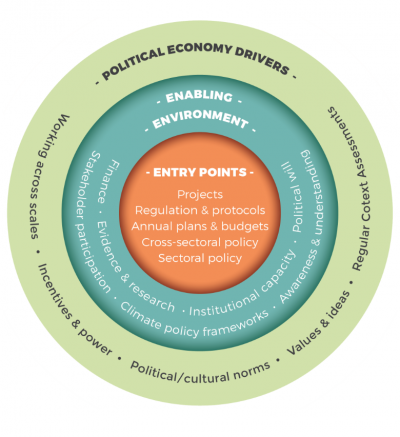Mainstreaming adaptation to climate change within governance systems in South Asia: An analytical framework and examples from practice

Introduction
Successful adaptation requires governments to change their investment, planning and policy processes. To support these actions, practitioners must engage with governance processes and identify the barriers and opportunities for climate adaptation mainstreaming. However, when tackling climate change, governments often do not fully consider how to integrate climate change resilience building into their decision making.
This ACT Learning Paper* describes a framework that allows governments to integrate climate change adaptation into governance systems, policies and plans.
Developed and launched by a group of national and international climate change experts between 2016-2018, the framework identifies barriers and opportunities for climate adaptation mainstreaming and has already helped 10 national and sub-national governments—including four South Asian countries (India, Pakistan, Nepal and Afghanistan)—change their investment, planning and policy processes to account for climate change.
This new framework supports practitioners and policy makers to understand how to mainstream adaptation within governance systems by focusing on three aspects:
- Entry points: Opportunities for integrating climate considerations into the planning and policy process.
- Enabling environment: The characteristics – people, institutions, resources etc – that help support the successful adoption of climate change adaptation policies and practices.
- Political economy drivers: The factors that influence and affect the enabling environment such as the interests and incentives facing different groups as well as formal and informal social, political and cultural norms.
The lessons from this work will be of interest for similar projects and programmes in the region and beyond.
Listen to a one-minute audio abstract on this framework, by Aditya Bahadur & Elizabeth Gogoi:
*Download the Learning Paper from the right-hand column.
In this ACT Learning Paper
The report includes sections on:
- Conceptual approach to the governance of climate change adaptation
- Entry points for mainstreaming
- Enabling environment for mainstreaming
- Political economy drivers
- The current state of play of the governance of adaptation to climate change
- Global governance of adaptation to climate change
- Regional governance of adaptation to climate change in South Asia
- National governance of adaptation to climate change
- Sub-national and local governance of adaptation to climate change
- Community governance of adaptation to climate change
- Challenges and opportunities for climate change governance
- Challenges for good governance of adaptation to climate change
- Opportunities for strengthening governance of adaptation to climate change
- Emerging lessons from ACT on climate change governance
- ACT’s learning on entry points for mainstreaming adaptation to climate change
- ACT’s learning on strengthening the enabling environment for mainstreaming
- ACT’s learning on understanding and addressing the underlying political economy drivers
Key lessons from ACT’s experience
- Understand governance challenges and constraints: Any adaptation project should consider issues related to institutional capacity, political will, and existing policy frameworks. This enabling environment should be assessed and regularly monitored, to identify potential governance risks and opportunities. ACT has done this through annual context assessment exercises.
- A supportive enabling environment is crucial: Integrating climate change into policy and plans will only succeed if measures are supported by sufficient resources, capacity and capabilities to implement and monitor the initiatives. ACT has focused on this by enabling access to finance and information, mobilising key stakeholders and political will, as well as supporting the development of the right policy frameworks and strengthening institutional capacity.
- Political economy drivers cannot be ignored: Projects should identify and understand the relative influence of different stakeholders within the system, as well as formal and informal institutions, norms and values. This helps to define the best formal and/or informal approach to influencing the government. ACT has operationalised this by using a variety of Political Economy Analysis tools.
- Governance occurs at multiple levels: Successful adaptation at one level of policy making will need to be supported by good governance at other levels. Therefore, ACT works at the national as well as sub-national levels across South Asia.
- Different entry points for adaptation should be used: Policy entry points for adaptation measures that are easiest to access (and where there is demand and interest from government), are not always those that have the highest returns. This is why ACT has strategically used a wide variety of ‘easy’ and ‘difficult’ entry-points to achieve the overall objective.
See the full paper for more lessons and much more detail.
ACT (Action on Climate Today) is an initiative funded with UK aid from the UK government and managed by Oxford Policy Management (OPM).
Since 2014 the Action on Climate Today (ACT) programme has been actively working in five South Asian countries – Afghanistan, Bangladesh, India, Nepal and Pakistan – to help national and sub-national governments plan for, and manage, the impacts of climate change in the water sector. The ACT programme has championed a Climate-Resilient Water Management (CRWM) approach as a way of increasing the resilience of water systems on which billions of people rely. The programme’s activities in this domain range from preparing urban flood management plans and adapting agriculture to increasing incidences to drought, to mainstreaming climate adaptation in water policies and estimating the future demand for water under different climate scenarios.
Find out more about the ACT programme in South Asia here: http://www.acclimatise.uk.com/collaborations/action-on-climate-today/
Suggested Citation
Gogoi, E., Bahadur, A. V. and Rumbaitis del Rio, C. (2018) Mainstreaming adaptation to climate change within governance systems in South Asia: An analytical framework and examples from practice, ACT Learning Paper, ACT (Action on Climate Today). Sourced from: http://www.acclimatise.uk.com/wp-content/uploads/2018/02/OPM_ACT_LP_Governance_Paper_final.pdf
(0) Comments
There is no content